News
Puget Sound Restoration Fund: Q&A with The Russell Family Foundation
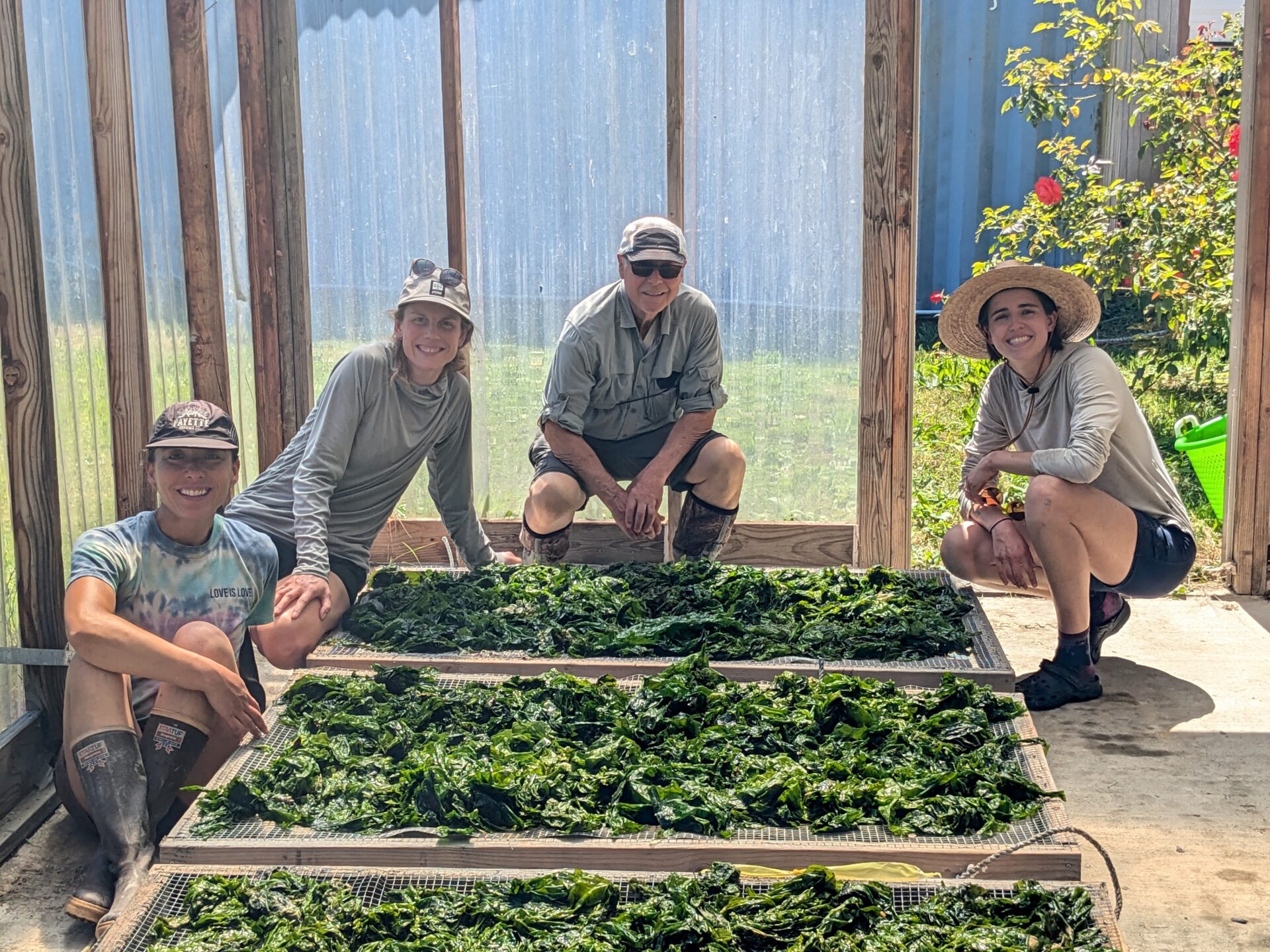
Puget Sound Restoration Fund (PSRF) is a nonprofit founded in 1997 to restore abundant marine resources and connections to them. PSRF focuses on restoring living marine habitats and native species, such as Olympia oysters, bull kelp, and pinto abalone. PSRF also works to reforge connections with healthy marine resources through restoration actions, shellfish gardening, and community events.
1. How does the restoration of Olympia oysters, a First Food of Coast Salish Tribes, contribute to regenerative and climate-resilient farming practices, and what are the specific ecological benefits of dense oyster beds in Puget Sound? Can you share how this project supports population rebuilding and ecosystem health while increasing climate resilience in aquaculture?
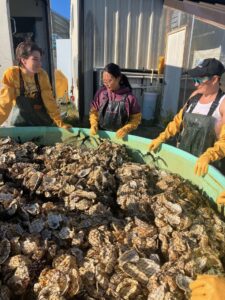 The restoration of Olympia oysters, both as a natural population and a cultivated food source, improves marine resilience (via estuary filtration and habitat), and farm resilience (via a diversified portfolio of species). These restoration efforts also provide Coast Salish Tribes direct access to traditional foods, supporting greater food sovereignty through harvesting at the farm or Tribal sites. Both natural and cultivated Olympia oysters send larvae into the surrounding waters, increasing settlement. As the local population grows, it develops into a natural oyster bed over time. Dense oyster beds in Puget Sound provide critical ecological benefits including water filtration, nitrogen cycling, and food web enhancement. The structured habitats that dense oysters provide support a community of species, including Dungeness crab, which settle out of the water column, and juvenile salmon, which rely on food and shelter before migrating to the ocean. Within an aquaculture setting, Olympia oysters are a climate-resilient choice for shellfish growers. Research shows that Olympia oyster larvae may be better at weathering acidified conditions, and their cultivation lower in the intertidal area may provide cooler growing conditions, reducing exposure to the heat of the day.
The restoration of Olympia oysters, both as a natural population and a cultivated food source, improves marine resilience (via estuary filtration and habitat), and farm resilience (via a diversified portfolio of species). These restoration efforts also provide Coast Salish Tribes direct access to traditional foods, supporting greater food sovereignty through harvesting at the farm or Tribal sites. Both natural and cultivated Olympia oysters send larvae into the surrounding waters, increasing settlement. As the local population grows, it develops into a natural oyster bed over time. Dense oyster beds in Puget Sound provide critical ecological benefits including water filtration, nitrogen cycling, and food web enhancement. The structured habitats that dense oysters provide support a community of species, including Dungeness crab, which settle out of the water column, and juvenile salmon, which rely on food and shelter before migrating to the ocean. Within an aquaculture setting, Olympia oysters are a climate-resilient choice for shellfish growers. Research shows that Olympia oyster larvae may be better at weathering acidified conditions, and their cultivation lower in the intertidal area may provide cooler growing conditions, reducing exposure to the heat of the day.
Could you share the process and potential benefits of restoring nutrient pathways from shellfish farms to upland farms, particularly in terms of enriching soils and enhancing agricultural sustainability? What are the expected outcomes of the exploratory project between the Nisqually Indian Tribe’s shellfish farm, the chicken operation in Yelm, and how will these findings be disseminated to the broader farming community?
In coastal communities throughout history, seaweed has been recognized as a nutrient rich source of soil-building organic matter. More recently, its critical role in rebuilding soil
carbon stocks and removing carbon and nutrients from coastal waters has become clear from the perspective of both mitigating climate change and protecting agricultural livelihoods. This project’s expected outcomes include:
a) Removal of seaweed from shellfish farms where it fouls beds and machinery
b) Passive dehydration and preparation of seaweed for transportation to upland farms c) Evaluation of the nutritional value of seaweed
d) Test applications of seaweed as a chicken feed additive
Learn more about this project here.
3. How does PSRF engage and collaborate with Puget Sound Tribes in the cultivation of Olympia oysters for commercial purposes, especially for Tribes that no longer have a food relationship with these oysters due to their absence on Tribal tidelands? What are the long-term goals for supporting Tribal food sovereignty through this initiative, and what role does PSRF’s conservation hatchery play in achieving these goals?
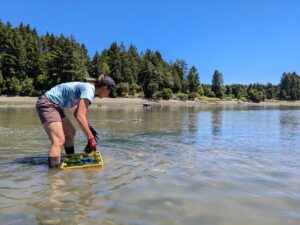 PSRF has co-created Olympia oyster restoration practices with over ten Tribes throughout Puget Sound since 1999. Within the past several years, five Tribes (Skokomish Tribe, Port Gamble S’Klallam Tribe, Tulalip Tribe, Swinomish Tribal Indian Community, and Stillaguamish Tribe) have reached out to PSRF to order Olympia oyster seed specifically for cultivation (either as seeded cultch or single oysters). Many of these Tribes wish to grow Olympia oysters, a First Food of Coast Salish Tribes, which have been inaccessible for a long time for a variety of reasons. As Tribal interest in traditional foods and food security grows, PSRF is playing a pivotal role in several biocultural restoration projects, involving not just Olympia oysters, but also basket cockles and bull kelp. With long-standing, trusted relationships with Tribes, PSRF operates the only conservation hatchery that produces restoration-grade Olympia oysters, cockles and bull kelp, suitable for both restoration and conservation aquaculture.
PSRF has co-created Olympia oyster restoration practices with over ten Tribes throughout Puget Sound since 1999. Within the past several years, five Tribes (Skokomish Tribe, Port Gamble S’Klallam Tribe, Tulalip Tribe, Swinomish Tribal Indian Community, and Stillaguamish Tribe) have reached out to PSRF to order Olympia oyster seed specifically for cultivation (either as seeded cultch or single oysters). Many of these Tribes wish to grow Olympia oysters, a First Food of Coast Salish Tribes, which have been inaccessible for a long time for a variety of reasons. As Tribal interest in traditional foods and food security grows, PSRF is playing a pivotal role in several biocultural restoration projects, involving not just Olympia oysters, but also basket cockles and bull kelp. With long-standing, trusted relationships with Tribes, PSRF operates the only conservation hatchery that produces restoration-grade Olympia oysters, cockles and bull kelp, suitable for both restoration and conservation aquaculture.
4. Who are your core partners in this food and farm ecosystem? And do you have ideas about how to connect and expand the local and regional ecosystem?
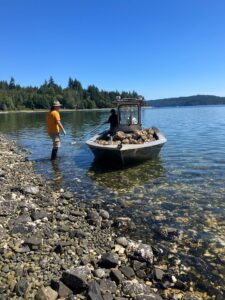 Core partners in the development of Olympia oyster cultivation and conservation aquaculture efforts include Tribal and non-Tribal shellfish growers, and resource managers. On the seaweed front, within the larger food and farm ecosystem, PSRF is working with a broad array of partners to explore multiple sea-to-land nutrient pathways. Current partners include several shellfish farmers in Puget Sound (e.g. Baywater Shellfish, Chuckanut Shellfish, Calm Cove Oyster Co), Viva Farms (a terrestrial food farm incubator program), Washington Sea Grant (marine resources education and outreach specialist), University of Washington and Washington State University (food systems, regenerative farming and soil science specialists). PSRF has a strong relationship with the shellfish farming community. In 2021, while piloting seaweed removal efforts with three growers, we also began sharing concepts, technologies, and terrestrial farm connections at regional meetings and conferences. Additional growers will be recruited through these networks and other connections, like the Pacific Coast Shellfish Growers Association, and the Washington Seaweed Collaborative (run by Washington Sea Grant). Terrestrial farms will be recruited through the Viva Farms and Land Grant Extension networks.
Core partners in the development of Olympia oyster cultivation and conservation aquaculture efforts include Tribal and non-Tribal shellfish growers, and resource managers. On the seaweed front, within the larger food and farm ecosystem, PSRF is working with a broad array of partners to explore multiple sea-to-land nutrient pathways. Current partners include several shellfish farmers in Puget Sound (e.g. Baywater Shellfish, Chuckanut Shellfish, Calm Cove Oyster Co), Viva Farms (a terrestrial food farm incubator program), Washington Sea Grant (marine resources education and outreach specialist), University of Washington and Washington State University (food systems, regenerative farming and soil science specialists). PSRF has a strong relationship with the shellfish farming community. In 2021, while piloting seaweed removal efforts with three growers, we also began sharing concepts, technologies, and terrestrial farm connections at regional meetings and conferences. Additional growers will be recruited through these networks and other connections, like the Pacific Coast Shellfish Growers Association, and the Washington Seaweed Collaborative (run by Washington Sea Grant). Terrestrial farms will be recruited through the Viva Farms and Land Grant Extension networks.
5. What are your top priorities this year/the next?
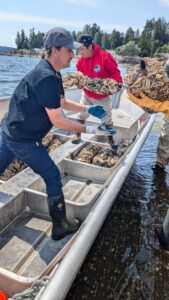 This year and next, we are focused on continuing to pioneer beneficial uses of excess marine seaweed to simultaneously improve shellfish growing areas and enrich soils in gardens and farms. We also aim to support and expand Tribal cultivation and restoration of native Olympia oysters to build marine resilience and support food sovereignty. With continued funding and support, we are eager to grow both program areas as PSRF’s Olympia oyster and seaweed programs bolster place-based connections to resources that support local communities.
This year and next, we are focused on continuing to pioneer beneficial uses of excess marine seaweed to simultaneously improve shellfish growing areas and enrich soils in gardens and farms. We also aim to support and expand Tribal cultivation and restoration of native Olympia oysters to build marine resilience and support food sovereignty. With continued funding and support, we are eager to grow both program areas as PSRF’s Olympia oyster and seaweed programs bolster place-based connections to resources that support local communities.